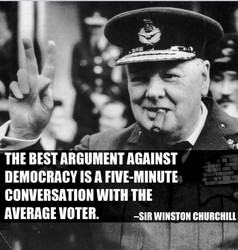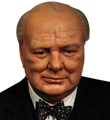Churchill On Democracy
|
| updated |
Copy Link Code
|
 For Winston Churchill, success mainly came in the form of politics. Although he is also known for his military achievements and leadership, as well as being an accomplished writer, most people think of Winston Churchill as a leader.
For Winston Churchill, success mainly came in the form of politics. Although he is also known for his military achievements and leadership, as well as being an accomplished writer, most people think of Winston Churchill as a leader.
Churchill's first attempt at politics failed. After resigning from the army, in 1899 he was invited to the the second candidate in the Conservative Party's bid for Robert Ascroft's Oldham constituency. After the sudden death of Ascroft, it was necessary to hold a double by-election. Although he lost the election – because of a recent trend against his party – his colleagues were rather impressed by the young man's vigorous attempt.
In 1900, Winston tried again, and won the Oldham seat in Parliament. As soon as he arrived, however, he immediately switched sides from the Conservative Party to a faction within, called the Hughligans. In 1904, following several years of vehement disagreement with his own party members, he physically crossed the floor in Parliament and joined the Liberal Party. In 1905, Churchill became the Under-Secretary of State for the Colonies, primarily concerning himself with South Africa following the Boer War. In 1906, he won the Manchester North West seat, serving until 1908, when he was promoted to President of the Board of Trade. The same year, he introduced a bill – the Trade Boards Bill – establishing the first minimum wage for Britain. The following year (1909) he started the Labour Exchanges, helping the unemployed find jobs. In 1911, he assisted in drafting the first legislation for unemployment pensions, known as the National Insurance Act. The same year, he became the First Lord of the Admiralty, serving into the First World War (1915) when he resigned from government and returned to the military.
During the years from 1915 through 1923, he held several military and political positions, including Secretary of State for War and also Secretary of State for Air. Losing two elections in 1922-1923, while affiliated with the Liberal Party, he finally rejoined the Conservative Party, and was appointed Chancellor of the Exchequer in 1924. By 1931, he had damaged his reputation within the party, and spent 1932-1940 voicing widely-varying opinions about fascist dictators and communism. In 1936, Churchill publicly announced his support for King Edward VIII (who was determined to marry an already-married woman), refusing to demand abdication, as his colleagues had requested, damaging his reputation.
When World War II started on September 3, 1939 (Britain officially declaring war on Germany), Winston was once again appointed as First Lord of the Admiralty. In 1940, after Chamberlain resigned and Lord Halifax turned down the position of prime minister, Churchill was asked by King George VI to assume the vital position. Despite a majority opinion for armistice, Churchill flatly refused, and began preparing the British people to support him. On June 18, 1940, he gave his infamous 'finest hour' speech to the House of Commons, telling them that war was about to begin. During his first speech as PM, he told Parliament "I have nothing to offer but blood, toil, tears, and sweat," which led to cheering and support from those who had previously ignored him.
His first time as PM was filled with great successes, controversy, and even failures. Churchill was known for his wit, charisma, and biting sarcasm, while maintaining unexpected relationships with other world leaders such as Franklin D. Roosevelt and Joseph Stalin. He was a party to numerous treaties, but he was also involved in tragedies such as the Dresden bombings, resulting in the deaths of approximately 200,000 refugees. When the war ended in 1945, he found little reason to celebrate, as he thought the British should now attack Russia because they might not follow previous agreements. Luckily, the British Chiefs of Staff Committee rejected the idea because it wasn't militarily feasible, avoiding the start of what could have become World War III.
